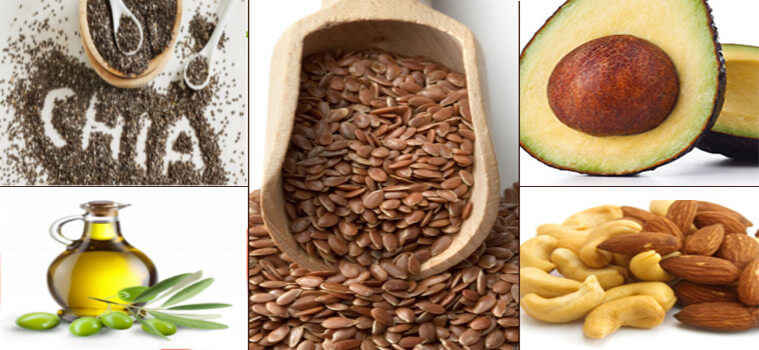
Some people still think fat is the enemy … It is not. We all need fat in our diet. We need it to give us energy and protect against extreme cold and heat. Fat also protects us from shock and keeps our cell membranes in tip top shape.
So What Is The Skinny (Pardon The Pun) On Fat?
What matter is the type of fat we eat. There are good fats and bad fats. Good fats decrease the risk of heart disease. Bad fats increase the risk of heart disease.
Monounsaturated fats are some of the healthiest fats. Polyunsaturated fats may also be good … in the right balance. The two main types of polyunsaturated fats are omega-6 and omega-3. The ideal balance of polyunsaturated fat is a ratio of 6 to 1 omega-6s to omega-3s. Anything higher than this leads to inflammation. As North Americans, we tend to have a higher ratio. We consume more omega-6 than we need. So, be sure to aim for more omega-3s in your diet.
Trans fats are bad fats (found in margarine and common in processed foods such as crackers, cookies, pies and pastries). Saturated fats also used to be considered bad fats. New research suggests that they may be more neutral – hence the surge in popularity of coconut oil.
Where Can You Get Good Fats?
1. Olive oil
Replace the butter you add to your veggies with olive oil. Comparing apples to apples, olive oil gives you more bang for your buck as a healthy fat. One tablespoon of olive oil contains 9 grams of unsaturated fat and only 2 grams of saturated fat. One tablespoon spoon of butter comes in at a whopping 7 grams of saturated fat, and only 4 grams of the heart healthy unsaturated fat. Olive oil is high in monounsaturated fats (80% of fat content), making it a popular oil for cooking. For added flavour, top your olive oil with fresh herbs and spices.
2. Avocados
Use avocado instead of cheese to top your veggies. Avocados receive a bad rap for being one of the only veggies with a high fat content. However, most of these fats are good fats. Comparing avocados to cheese, 6 slices of avocado (100 calories) contain 8 grams of unsaturated fat and only 2 grams of saturated fat. One slice of cheese, also at 100 calories, contains 4 grams of saturated fat, and 4 grams of unsaturated fat. Avocados are also a good source of fiber, vitamin C, vitamin K and folate. Avocados are also sodium and cholesterol-free.
3. Walnuts
Use walnuts to top your salad or as a simple snack. Walnuts are a great source of omega-3s. A 100 calorie serving (approximately 8 walnut halves) contains 5919 mg of omega-3, making walnuts one of the best sources of omega-3. They are a good source of copper, and a very good source of magnesium. Magnesium is important for maintaining the health of your bones. It is crucial for proper heart function and is thought to reduce the risk of high blood pressure AND heart disease… This is even more reason to choose walnuts as a healthy snack!
4. Ground Flaxseed
Ground flaxseed is a nutritional powerhouse. A 100 calorie serving (about 2 tablespoons) contains a good ratio of omega-3 to omega-6, and provides 20% of your daily fiber needs. We typically do not get enough fiber, so imagine being able to meet more of your fiber needs by simple tweaks in your diet!
Ground flaxseed also provides many more nutrients. It is a good source of magnesium, phosphorus, and copper, and a very good source of thiamine (Vitamin B1) and manganese. Thiamine is important for proper nerve function.
Flaxseed is also a good source of lignans, which are compounds that have biological activity in the body. Lignans are important because they block the activity of estrogen. This may reduce the risk of breast, colon, ovarian, and prostate cancer.
For a quick and easy salad dressing, mix red wine vinegar, olive oil, ground flaxseed, and a bit of honey for added sweetness. If you have a sweet tooth, add ground flaxseed to your muffin batter for added fiber.
5. Almonds
Almonds are very high in omega-6s. However, they are also low in omega-3s. For this reason, snack on almonds occasionally or consider mixing your almonds with walnuts, which have more omega-3s.
A 100 calorie serving (17 almonds), provides 22% of your daily Vitamin E needs. Vitamin E may reduce the risk of heart disease by reducing inflammation. Like other nuts, almonds are naturally low in cholesterol and sodium. To ensure proper portion control and enjoyment of your salad, think about having slivers of almonds instead of whole almonds, on your salads.
6. Cashews
Cashews are a good source of manganese, copper, magnesium, and phosphorus. Magnesium, manganese, and phosphorus are all important for bone health. Cashews contain more fat than some other nuts, so be careful with your portions. Try eating a few at a time (easier said than done!), or make your own nut mix.
7. Chia seeds
Chia seeds are a popular power food. Chia seeds are very low in cholesterol and sodium. They are a good source of calcium and phosphorus, and a very good source of dietary fiber and manganese. To incorporate chia seeds into your diet, try adding chia seeds to your favourite smoothie.
REFERENCES:
Whitney, E and Rady Rolfes, S. Understanding Nutrition 11th edition. Belmont: Thomson Wadsworth, 2008.
https://www.ncbi.nlm.nih.gov/pmc/articles/PMC4744652/
https://www.ncbi.nlm.nih.gov/pmc/articles/PMC3138219/
http://nutritiondata.self.com/facts/